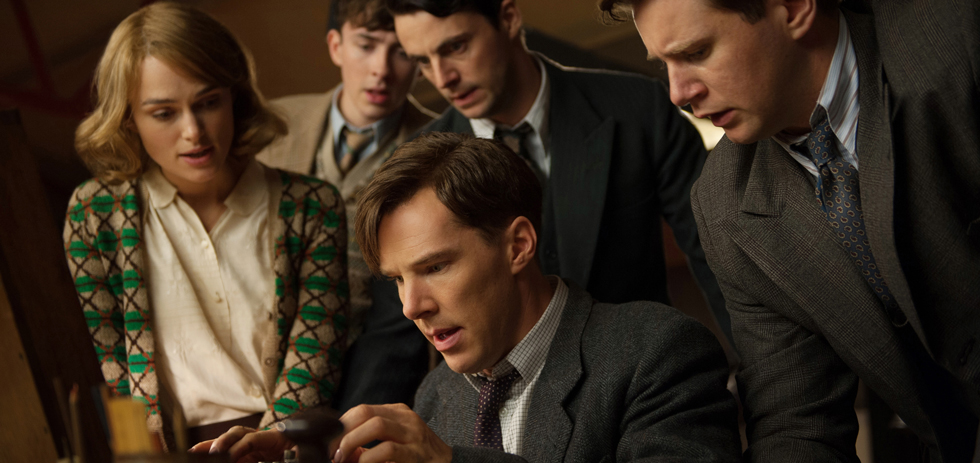
While playing legendary code-breaker Alan Turing in The Imitation Game, Benedict Cumberbatch intones that “sometimes it is the people no one imagines anything of who do the things that no one can imagine.” What the film better demonstrates is how those same people tend to have their lives squashed into award-courting trifles. The notion of adapting Turing’s monumental legacy is honourable, but in trying to appease the sensibilities of Oscar voters, this turns him into a simplistic caricature to best augment Benedict Cumberbatch’s chances come awards season.1 Blankly obvious dialogue mixes with a network TV-level treatment of neurosis to make a minor feature that will inspire little beyond statuette nods for its strong cast.
The plot jumps between three periods in Turing’s life. The first is in 1952, where a police investigator (the ever-dependable Rory Kinnear) brings him in for questioning after a befuddling house call. Here, Turing begin to retell his personal story, mostly in the form of a flashback to World War II, the setting for most of the film. Here, Commander Deniston (Charles Dance) and Major General Menzies (Mark Strong) recruit him to decode intercepted Nazi messages so they can – and this next part is important, because they repeat it a dozen times – win the war. He gets on the wrong side of his peers and buries himself in plans for a machine that can sort through the myriad of cryptographic variables for them, but his employment of mathematician Joan Clarke (Keira Knightley) pays dividends by teaching him to better associate with his team. His lack of patriarchal disregard for her skills comes from his guarded homosexuality, which we learn from passionless childhood flashbacks-within-the-flashback is a secret he has had to suppress in order to continue in the fields of study he holds dearest. Turing proposed to Clarke both to continue the illusion and to keep her away from the domesticity her parents will otherwise force upon her, though the stress of secrecy and espionage mounts further as their time at Bletchley Park crawls on.
The film’s big pull early on is having Cumberbatch be the smartest guy in the room, which boils down to antisocial-savant genius antics like that seen on Sherlock. This means characterisation that is done in loud and unambiguous terms – he talks fast, he spins curt analogies to declare his own brilliance, and his colleagues shout impatiently at him. This broad approach isn’t a huge problem by itself, since it’s arguable that they will fade from public memory long before Turing’s real-world accomplishments do, and anything that might inspire curiosity in the latter can’t be awful. The trouble comes is when the stakes are raised and the film makes simplistic attempts to grapple with the ethical dilemmas involved in that work. The screenplay, by Graham Moore (itself based on a biography), wants to find the Venn Diagram overlap between this and revelations about his personal life, but it deals with Turing’s homosexuality so flatly as to still feel like a technicality; something to deal with on the road to platitudes like that quoted above. Its erring from a more veritable depiction of Turing’s neglect from his own government comes off like an effort to preserve its appeal to the old guard in charge of awards season, which is an ironic kind of neglect all its own.2
To worsen matters, it’s also the kind of film that will beat you over the head with its historical context. I’ve mentioned already how often “the war” is dropped as though speaking to an assembly hall, but the brief instances of retro war footage and CGI reconstructions take this prestige thriller into the ham-fisted territory of History Channel docos. It feels like a jarring intrusion given the capable direction by Morten Tyldum (Headhunters) and production design by Maria Djurkovic (Tinker Tailor Soldier Spy), which create an aesthetic that is nicely believable in WW2 scenes but is too rigidly adhered to throughout the other two time periods, rendering the cuts between them inelegant and staid.3 This only increases the traditional “TV” feel of the movie as a whole, and also makes the action in the research centre that much more removed from the actual peril it wants but fails to capitalise on.
There is slight improvement when it gives their talented actors chances to shine. Cumberbatch is as committed as the film’s pull quotes will tell you, but the screenplay makes him a mostly irritating and pretentious figure in a way he can’t quite overcome. The true hero of the film is Knightley, since she has a much more compelling character to play and a better sense for the dry English humour the dialogue is aspiring to. Dance, Strong, Matthew Goode and the other supporting players have small room to play, but interestingly it’s Matthew Beard as a young buck in the group who inspires the most sympathy when his brother is caught in the battlefield. It’s the only moment when the film drives the head-spinning espionage of the project home, and finds a liveliness that respects the wartime tragedy it’s so keen to remind us of.
Therein lies the key issue with The Imitation Game – like its protagonist, it devises a plan filled with great promise and potential, but it differs by failing to deliver on that plan and wend its way out of scrutiny. He tells us early on to “listen carefully” and to reserve our judgements of his actions for later, but because of its ham-fisted approach, the moment of revelation winds up as an ignoble whimper for affection.
Around the Staff
| Virat Nehru | |
| Imogen Gardam |
